By Dr.Manzoor Ahmad Yetoo
The emerging field of sustainable entrepreneurship, has its roots in the concept that grew out of the conservation and environmental movement of the 1970’s. The Merriam-Webster on-line dictionary defines ‘sustainable’ as “…relating to, or being a method of harvesting or using a resource so that the resource is not depleted or permanently damaged; or relating to a lifestyle involving the use of sustainable methods…” sustainable development ties together concern for the carrying capacity of natural systems; that is the load capability of nature to support all life, i.e., natural capital, and human challenges of economic growth.
Dating from the 1970’s when the concept emerged in reference to establishing limits on developed growth, the term “sustainability” was and is used to blend ecology and economic growth, with terms such as ‘limits to growth’ and ‘steady state economy’ contributing to the environmental movement that caused wholesale changes in building and zoning codes across the nations, relating to economic development, particularly land development. The idea that we have unlimited resources to be developed was challenged by the newer idea of limited resources that must be wisely developed in concert with nature has resulted in competing forces which have shaped our economic development over the last forty years. Practitioners of sustainable development consider it to have three elements: environmental sustainability, economic sustainability and sociopolitical sustainability. Special interests groups on both sides of the spectrum have laid claim to this concept to perpetuate their own agendas. However, a common sense approach, in my mind, has always been the preferred, particularly when we almost unanimously agree in today’s world that there is a natural limit to resources which must be recognized.
An example of how the free market is used to accomplish sustainability is the work pioneered by the Santa Fe Institute’s Dr. Brian Arthur who applied natural principles of biology to the study of economics, in particular economic growth; which has become known as ‘The Santa Fe Approach’. Arthur was very interested in explaining how economic markets work, how business forms, in terms the natural world, and how the human organization, in order to grow, must adapt and assimilate to its environment, constantly adjusting to changes. The ‘The Santa Fe Approach’ was a leading concept that helped to pave the way for a new field in economics called ‘ecological economics’. The concept of sustainable development has been furthered enriched by the new field of ecological economics popularized by Dr. Robert Costanza who founded the International Society for Ecological Economics (ISEE) .
The objective of ecological economics is to ground economic thinking and practice in physical reality, especially in the laws of thermodynamics and biological systems. It accepts as a goal the improvement of human wellbeing through economic development, and seeks to ensure achievement of this through planning for the sustainable development of ecosystems and societies. Ecological economics distinguishes itself from neoclassical economics primarily by the assertion that economics is a subfield of ecology, in that ecology deals with the energy and matter transactions of life and the Earth, and the human economy is by definition contained within this system. This system is defined as natural capital, which consists of all non-renewable resources such as oil, coal, gas, and minerals, and renewable resources such as ecosystems that comprise the planet, in both quantitative and qualitative terms. It involves such terms as ‘carrying capacity’ which refers to the ability of nature to support human activities, and goes to the center of what sustainable development is, and from which emerged sustainable entrepreneurship.
The Merriam Webster Dictionary defines an entrepreneur as one who organizes, manages and assumes the risk of a business or enterprise. Often we use business and enterprise interchangeable to refer to the same thing. The word ‘entrepreneur’ comes from the French word ‘entreprendre’, which means “to undertake”. In a business context it means to undertake a business venture. Entrepreneurship and small business are typically used synonymously, interchangeably and presented as one in the same. Actually, entrepreneurship differs from small business in four critical ways: amount of wealth creation, speed of wealth accumulation, risk and innovation.
In the case of acceptable definitions of sustainable entrepreneurship, where reference is made to the common good, I would like to clarify that sustainable entrepreneurship cannot and should not be about establishing some kind of social common good, as in a communal framework associated with planned economies such as the former Soviet Union, East Germany, Cuba, Venezuela and Socialists African counties. It is an oxymoron to do so.
Rather, in my view, sustainable entrepreneurship is the process of sustaining a level of entrepreneurial development as to create a paradigm shift in economic activity such that national GDP, job growth, capital investment, technology advancement, and quality of life is unmatched, unsurpassed and unequalled. we realize this seems a bit altruistic and sounds like Utopia. But it is not. We can and should strive through local, state and national efforts to seek to establish an economic mentality that is strategically focused on entrepreneurship and authentic organic economic growth at the community level across JAMMU & KASHMIR. We can and should incorporate the concept of sustainability into the free market consciousness and allow the consummate entrepreneur, who seeks wealth creation within a tremendous risk-reward environment, through sustained invention and innovations, to achieve success. We can least forget that it was , has and will be entrepreneurial development that made our country great.
Our state Jammu and Kashmir is lagging behind the entrepreneurship development and large chunk of population especially our youth face a lot of unemployment problems due to flop corporate sector and dependence on Govt. jobs. However it is worth to mention here that some initiatives have been taken by our Govt. to boost entrepreneurship development by setting entrepreneurship awareness institutions , but million dollar question is do we have in it the edge of sustainable entrepreneurship? And are we aware about such programmes? Is our ignorant entrepreneur given due awareness about sustainability? Do we have expertise for this purpose? We need more of that now and try to introduce sustainability expertise in all sorts of entrepreneurship development or else we will end with unsustainable growth and will be responsible for a catastrophe for already dwindled corporate sector of Jammu and Kashmir.
(The author is an expert in environment ,project & waste Management, occupational safety& health & pollution control & empanelled expert in Indo European Chamber and commerce &Industry).
You may reach him at:
manzooryetoo@yahoo.co.in)


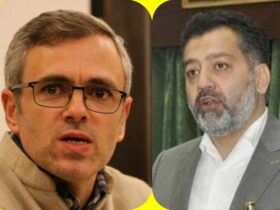


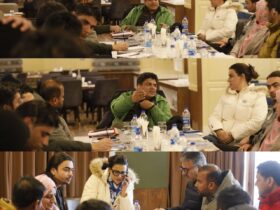




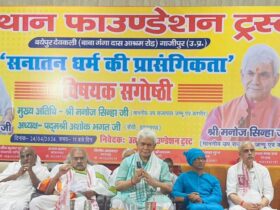


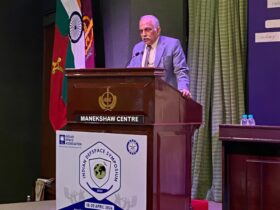
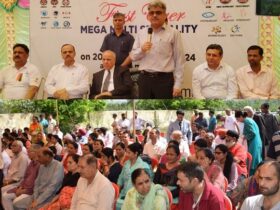
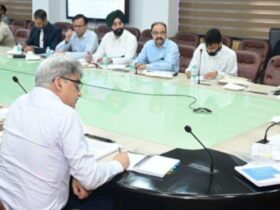

Leave a Reply